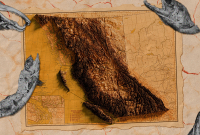Support strong Canadian climate journalism for 2025
BC United Leader Kevin Falcon couldn't resist sarcasm when asked on Tuesday how his party's rebranding from its long-standing identity as the British Columbia Liberals was going.
"Spectacularly," he said with a wry laugh, before adding "obviously, I think it could have gone way better."
In hindsight, even this was an understatement.
About 24 hours later, Falcon was standing behind a B.C. Conservative Party podium to announce his decision to end BC United's election campaign, withdraw its candidates' nominations, and urge voters to instead support the Conservatives in the Oct. 19 provincial ballot.
As BC United candidates and staff pondered their futures, strategists and communications experts pointed to last year's ill-fated rebranding exercise, championed by Falcon, as a harbinger of the party's implosion. Falcon also failed to capture a rightwards shift in political sentiment, they said, and instead it was John Rustad's Conservatives who did so.
To make matters worse, the rebranding coincided with the soaring popularity of the B.C. Conservatives, who are not affiliated with the Conservative Party of Canada.
Campaign strategist Allie Blades, who worked on the BC United rebrand for the Mash Strategy digital political consulting agency, blamed Falcon for the exercise's failure.
Earlier this month, BC United said internal polling suggested up to 30 per cent of people in B.C. were unaware the party changed names in April 2023.
"He just didn't listen," said Blades about Falcon's approach to the rebrand effort. "He had a committee of people responsible for the name change. Didn't listen to them. I'm sure that those staff and caucus people we've seen move over to the Conservatives made that decision partly because they weren't listened to either."
She said the rebrand failed because the party did not connect its new name and look to a message about what BC United stood for.
"You can design a great logo," said Blades. "You can put out some ads, but it didn't answer the problem which the party had, which was, what do they stand for and where are they on the political spectrum."
Under former premiers Christy Clark and Gordon Campbell, B.C. residents knew the brand of the B.C. Liberals, as the party of free enterprise and prosperity.
"But this was a missed opportunity for BC United to brand themselves in what they stood for and what their values are," said Blades.
Falcon made the party's rebranding and name change a key promise during his campaign for the B.C. Liberal leadership, and the party said 80 per cent of members supported the name change to BC United.
Blades said many older party members, including conservative former caucus members, believed the B.C. Liberal name confused and turned off voters who did not support the federal Liberals.
The former B.C. Liberals were not affiliated with any federal party, but the pressure to change names persisted, she said.
After Falcon became leader in February 2022, the party started to lose momentum in part because he did not reach out to his younger leadership opponents, including Val Litwin and Gavin Dew, who is now a Conservative candidate, Blades said.
"We were politically soulless for a while," she said.
Prof. David Black, a political communications expert at Greater Victoria's Royal Roads University, said the failure of the BC United rebrand was "puzzling" because other name changes in Saskatchewan and Alberta have worked.
The former Progressive Conservative and Wildrose parties in Alberta merged in 2017 to become the United Conservative Party, while the Progressive Conservatives in Saskatchewan emerged as the Saskatchewan Party in the 1990s after a major scandal, he said.
Black said while people suggest the BC United rebrand was poorly funded, badly communicated and poorly managed by Falcon, consideration should also be given to the shifting political environment in B.C.
"What is different from the other rebrands mentioned above is that public sentiment on the centre-right was shifting already in early 2023 and a more right-leaning and more populist B.C. voter was looking for an alternative," he said.
"John Rustad became leader of that alternative."
This report by The Canadian Press was first published Aug. 29, 2024.




Comments